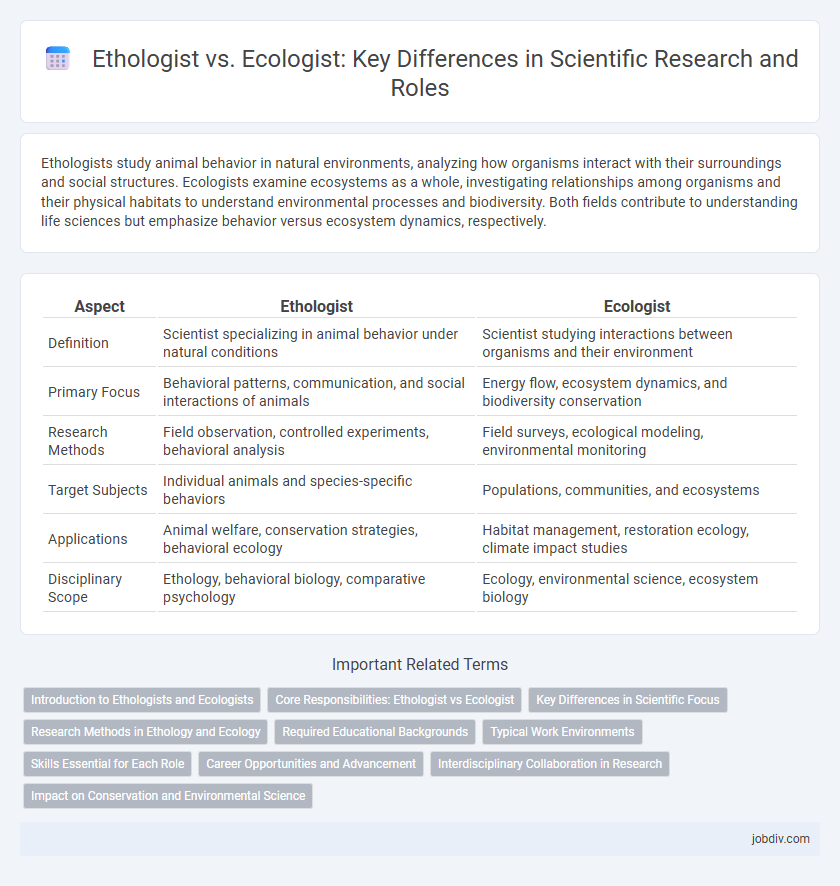Ethologists study animal behavior in natural environments, analyzing how organisms interact with their surroundings and social structures. Ecologists examine ecosystems as a whole, investigating relationships among organisms and their physical habitats to understand environmental processes and biodiversity. Both fields contribute to understanding life sciences but emphasize behavior versus ecosystem dynamics, respectively.
Table of Comparison
| Aspect | Ethologist | Ecologist |
|---|---|---|
| Definition | Scientist specializing in animal behavior under natural conditions | Scientist studying interactions between organisms and their environment |
| Primary Focus | Behavioral patterns, communication, and social interactions of animals | Energy flow, ecosystem dynamics, and biodiversity conservation |
| Research Methods | Field observation, controlled experiments, behavioral analysis | Field surveys, ecological modeling, environmental monitoring |
| Target Subjects | Individual animals and species-specific behaviors | Populations, communities, and ecosystems |
| Applications | Animal welfare, conservation strategies, behavioral ecology | Habitat management, restoration ecology, climate impact studies |
| Disciplinary Scope | Ethology, behavioral biology, comparative psychology | Ecology, environmental science, ecosystem biology |
Introduction to Ethologists and Ecologists
Ethologists study animal behavior through observation and experimentation to understand behavioral patterns in natural environments, while ecologists examine interactions among organisms and their ecosystems to assess biodiversity and environmental health. Ethologists emphasize innate and learned behaviors within species, often analyzing social dynamics and communication, contrasting with ecologists' broader focus on ecological relationships and energy flow. Both disciplines contribute critical insights for conservation biology, behavioral science, and habitat management.
Core Responsibilities: Ethologist vs Ecologist
Ethologists primarily study animal behavior under natural conditions, focusing on behavioral patterns, communication, and social interactions within species. Ecologists analyze ecosystems by investigating relationships among organisms and their environments, emphasizing energy flow, nutrient cycling, and biodiversity. Both disciplines contribute to understanding biological systems but differ in scale and focus, with ethology centered on individual and species behavior and ecology targeting ecosystem dynamics.
Key Differences in Scientific Focus
Ethologists specialize in the scientific study of animal behavior, analyzing patterns, instincts, and communication within specific species, often in controlled or natural environments. Ecologists focus on the interactions between organisms and their ecosystems, examining relationships, energy flows, and environmental impacts on biodiversity at population and community levels. The primary distinction lies in ethologists prioritizing behavioral mechanisms, while ecologists emphasize ecological systems and environmental processes.
Research Methods in Ethology and Ecology
Ethologists primarily utilize observational techniques and experimental manipulations in controlled environments to study animal behavior and its evolutionary significance, employing methods such as focal animal sampling and ethograms. Ecologists focus on field surveys, remote sensing, and ecological modeling to analyze species interactions, population dynamics, and ecosystem processes in natural habitats. Both disciplines rely on statistical analyses and longitudinal studies, but ethology emphasizes behavioral experiments while ecology prioritizes habitat and environmental data collection.
Required Educational Backgrounds
Ethologists typically require advanced degrees in biology, zoology, or psychology, with specialized training in animal behavior through hands-on research and fieldwork. Ecologists generally pursue education in environmental science, ecology, or biology, emphasizing ecosystem dynamics, biodiversity, and spatial analysis. Both fields often demand postgraduate studies such as a master's or PhD to conduct independent research and contribute to scientific knowledge.
Typical Work Environments
Ethologists primarily conduct research in controlled laboratory settings or natural habitats to observe animal behavior and social interactions. Ecologists typically work in diverse outdoor environments, such as forests, wetlands, and marine ecosystems, analyzing relationships between organisms and their surroundings. Both professions often collaborate with research institutions and conservation organizations to apply their findings in environmental management and species preservation.
Skills Essential for Each Role
Ethologists require expertise in animal behavior observation, data collection, and behavioral analysis techniques to understand species interactions and adaptive behaviors. Ecologists must possess strong skills in ecosystem assessment, environmental impact analysis, and proficiency with GIS tools to study relationships between organisms and their habitats. Both roles demand scientific research capabilities, but ethologists emphasize behavioral science while ecologists prioritize ecosystem dynamics.
Career Opportunities and Advancement
Ethologists specialize in animal behavior, leading to career opportunities in research institutions, wildlife conservation, and academic settings focused on behavioral studies. Ecologists analyze ecosystems and environmental interactions, with career paths in environmental consulting, natural resource management, and governmental agencies addressing biodiversity and habitat preservation. Advancement in both fields typically involves obtaining advanced degrees, publishing research, and gaining expertise in specialized subfields such as behavioral ecology for ethologists or restoration ecology for ecologists.
Interdisciplinary Collaboration in Research
Ethologists and ecologists collaborate extensively to advance understanding of animal behavior within environmental contexts, integrating behavioral analysis with ecosystem dynamics. This interdisciplinary partnership enhances research outcomes by combining ethological methods such as behavioral observation with ecological modeling to assess species interactions and habitat impacts. Such synergy fosters comprehensive insights that inform conservation strategies and biodiversity management.
Impact on Conservation and Environmental Science
Ethologists contribute to conservation by studying animal behavior to inform habitat management and species protection strategies, enhancing the effectiveness of interventions in wildlife populations. Ecologists analyze the relationships between organisms and their environments, providing critical insights into ecosystem dynamics and biodiversity conservation at broader scales. Integrating ethological behavior patterns with ecological data improves conservation outcomes by promoting adaptive management approaches tailored to specific species and habitats.
Ethologist vs Ecologist Infographic

 jobdiv.com
jobdiv.com